Analyzing Leadership Theories, Ethics, and Challenges in Flexible Work
VerifiedAdded on 2023/06/07
|14
|5327
|209
Essay
AI Summary
This essay provides a detailed analysis of various leadership theories, including trait theory, transformational theory, and transactional theory, and their effectiveness in different contexts. It further explores the characteristics of global leaders and the challenges they face in a globalized environment, emphasizing the importance of self-awareness, cultural diversity, and humility. The essay also discusses the role of motivation, rewards, and punishments in the workplace, referencing Herzberg's two-factor theory. Finally, it addresses the challenges leaders face in the increasingly flexible future of work, including maintaining team cohesion and managing remote teams, and examines ethical and destructive leadership theories.
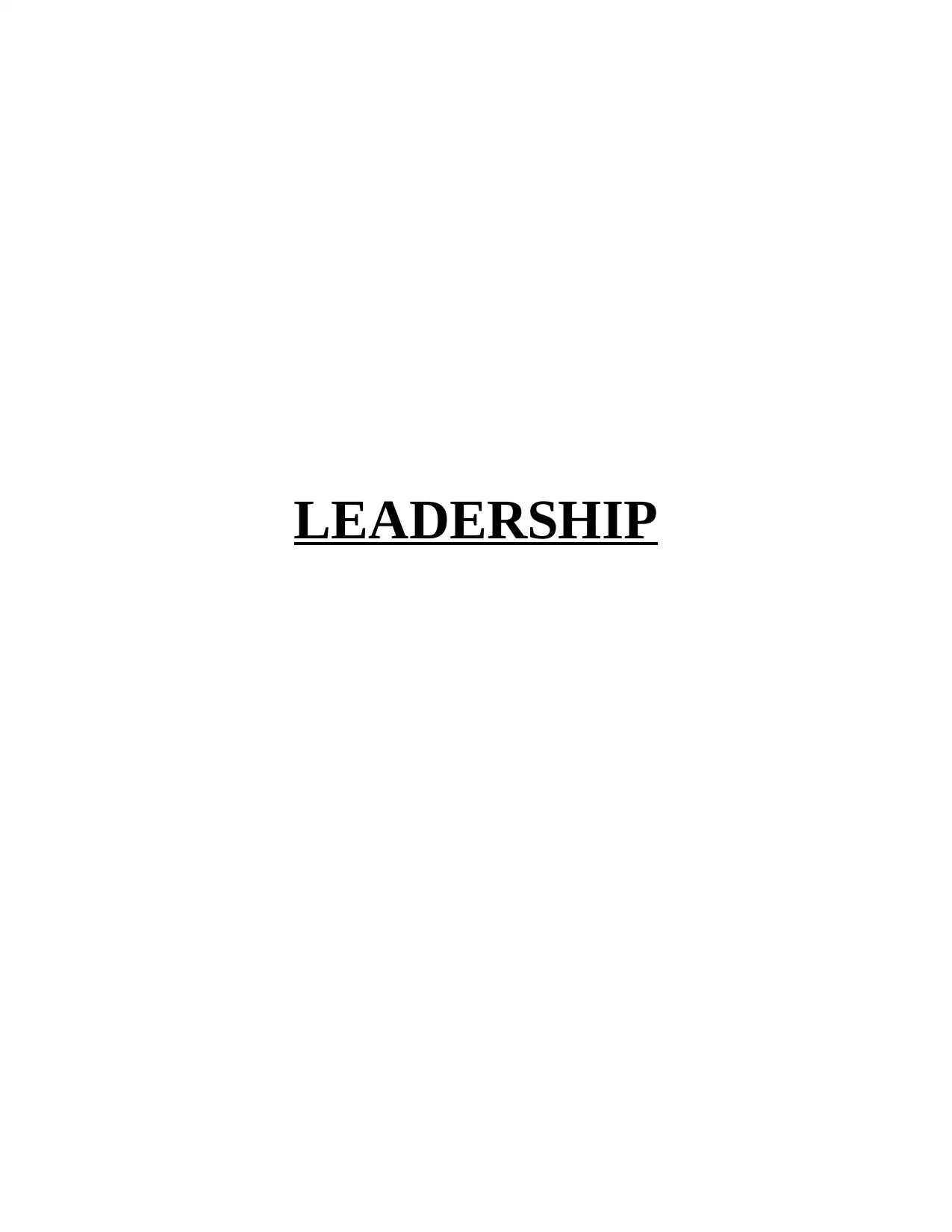
LEADERSHIP
Paraphrase This Document
Need a fresh take? Get an instant paraphrase of this document with our AI Paraphraser
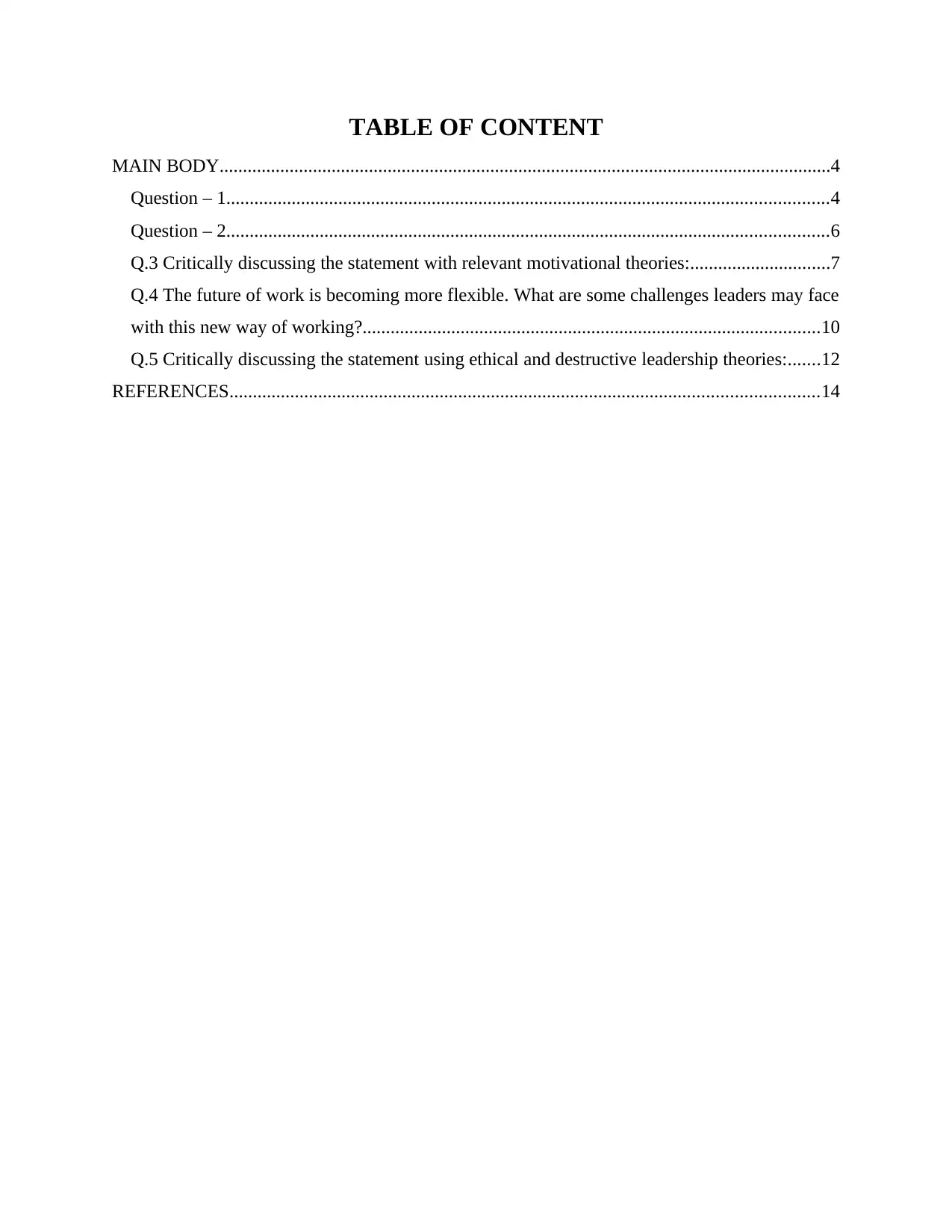
TABLE OF CONTENT
MAIN BODY...................................................................................................................................4
Question – 1.................................................................................................................................4
Question – 2.................................................................................................................................6
Q.3 Critically discussing the statement with relevant motivational theories:..............................7
Q.4 The future of work is becoming more flexible. What are some challenges leaders may face
with this new way of working?..................................................................................................10
Q.5 Critically discussing the statement using ethical and destructive leadership theories:.......12
REFERENCES..............................................................................................................................14
MAIN BODY...................................................................................................................................4
Question – 1.................................................................................................................................4
Question – 2.................................................................................................................................6
Q.3 Critically discussing the statement with relevant motivational theories:..............................7
Q.4 The future of work is becoming more flexible. What are some challenges leaders may face
with this new way of working?..................................................................................................10
Q.5 Critically discussing the statement using ethical and destructive leadership theories:.......12
REFERENCES..............................................................................................................................14
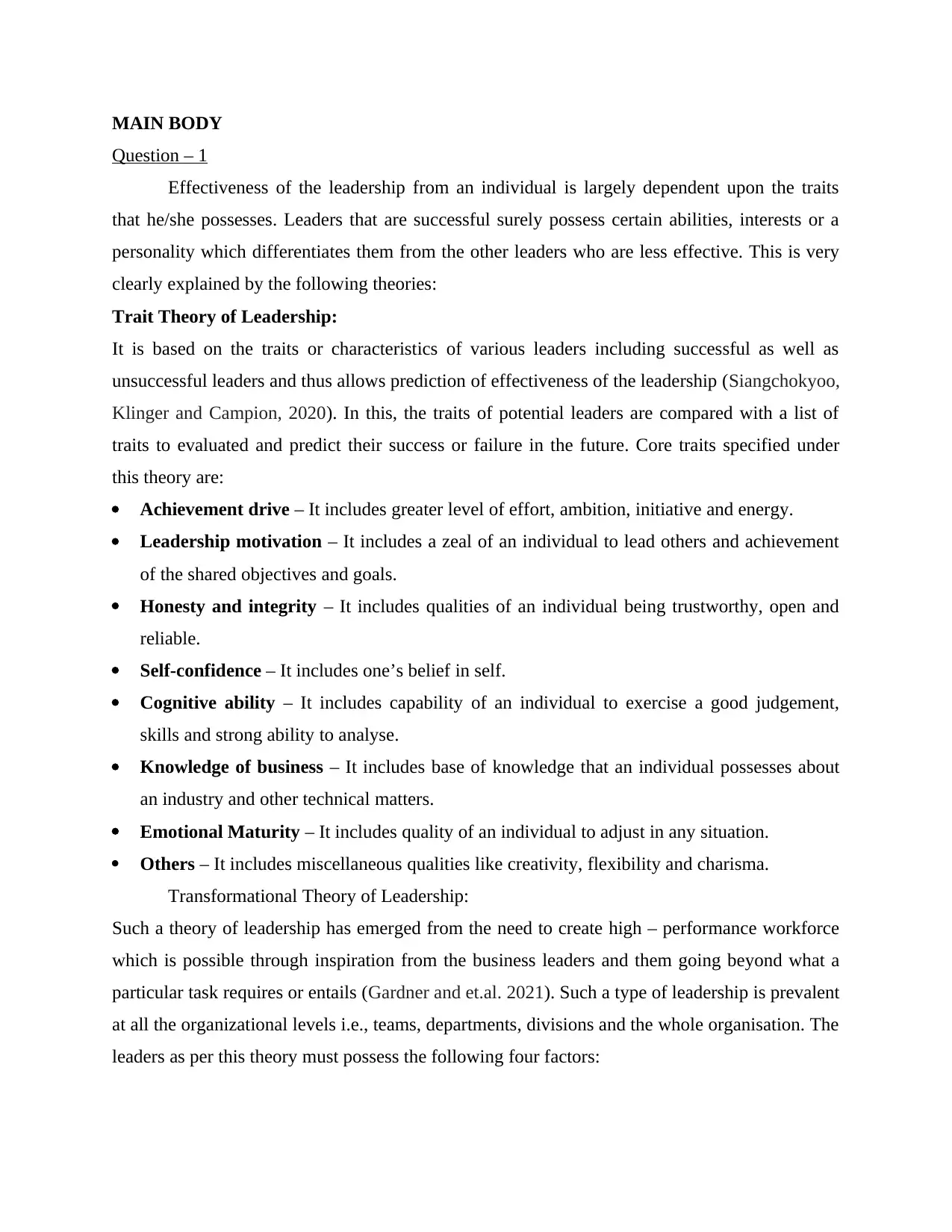
MAIN BODY
Question – 1
Effectiveness of the leadership from an individual is largely dependent upon the traits
that he/she possesses. Leaders that are successful surely possess certain abilities, interests or a
personality which differentiates them from the other leaders who are less effective. This is very
clearly explained by the following theories:
Trait Theory of Leadership:
It is based on the traits or characteristics of various leaders including successful as well as
unsuccessful leaders and thus allows prediction of effectiveness of the leadership (Siangchokyoo,
Klinger and Campion, 2020). In this, the traits of potential leaders are compared with a list of
traits to evaluated and predict their success or failure in the future. Core traits specified under
this theory are:
Achievement drive – It includes greater level of effort, ambition, initiative and energy.
Leadership motivation – It includes a zeal of an individual to lead others and achievement
of the shared objectives and goals.
Honesty and integrity – It includes qualities of an individual being trustworthy, open and
reliable.
Self-confidence – It includes one’s belief in self.
Cognitive ability – It includes capability of an individual to exercise a good judgement,
skills and strong ability to analyse.
Knowledge of business – It includes base of knowledge that an individual possesses about
an industry and other technical matters.
Emotional Maturity – It includes quality of an individual to adjust in any situation.
Others – It includes miscellaneous qualities like creativity, flexibility and charisma.
Transformational Theory of Leadership:
Such a theory of leadership has emerged from the need to create high – performance workforce
which is possible through inspiration from the business leaders and them going beyond what a
particular task requires or entails (Gardner and et.al. 2021). Such a type of leadership is prevalent
at all the organizational levels i.e., teams, departments, divisions and the whole organisation. The
leaders as per this theory must possess the following four factors:
Question – 1
Effectiveness of the leadership from an individual is largely dependent upon the traits
that he/she possesses. Leaders that are successful surely possess certain abilities, interests or a
personality which differentiates them from the other leaders who are less effective. This is very
clearly explained by the following theories:
Trait Theory of Leadership:
It is based on the traits or characteristics of various leaders including successful as well as
unsuccessful leaders and thus allows prediction of effectiveness of the leadership (Siangchokyoo,
Klinger and Campion, 2020). In this, the traits of potential leaders are compared with a list of
traits to evaluated and predict their success or failure in the future. Core traits specified under
this theory are:
Achievement drive – It includes greater level of effort, ambition, initiative and energy.
Leadership motivation – It includes a zeal of an individual to lead others and achievement
of the shared objectives and goals.
Honesty and integrity – It includes qualities of an individual being trustworthy, open and
reliable.
Self-confidence – It includes one’s belief in self.
Cognitive ability – It includes capability of an individual to exercise a good judgement,
skills and strong ability to analyse.
Knowledge of business – It includes base of knowledge that an individual possesses about
an industry and other technical matters.
Emotional Maturity – It includes quality of an individual to adjust in any situation.
Others – It includes miscellaneous qualities like creativity, flexibility and charisma.
Transformational Theory of Leadership:
Such a theory of leadership has emerged from the need to create high – performance workforce
which is possible through inspiration from the business leaders and them going beyond what a
particular task requires or entails (Gardner and et.al. 2021). Such a type of leadership is prevalent
at all the organizational levels i.e., teams, departments, divisions and the whole organisation. The
leaders as per this theory must possess the following four factors:
⊘ This is a preview!⊘
Do you want full access?
Subscribe today to unlock all pages.

Trusted by 1+ million students worldwide
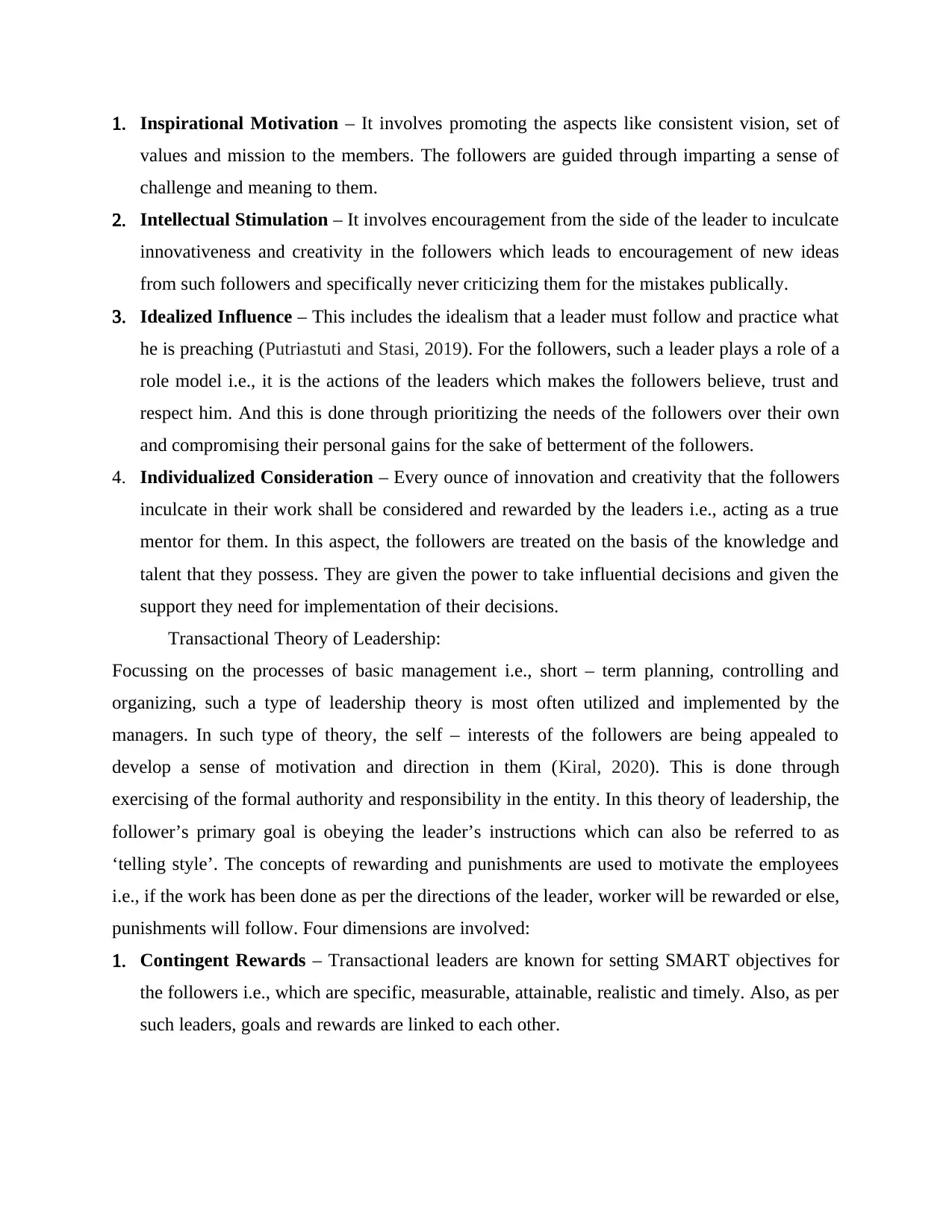
1. Inspirational Motivation – It involves promoting the aspects like consistent vision, set of
values and mission to the members. The followers are guided through imparting a sense of
challenge and meaning to them.
2. Intellectual Stimulation – It involves encouragement from the side of the leader to inculcate
innovativeness and creativity in the followers which leads to encouragement of new ideas
from such followers and specifically never criticizing them for the mistakes publically.
3. Idealized Influence – This includes the idealism that a leader must follow and practice what
he is preaching (Putriastuti and Stasi, 2019). For the followers, such a leader plays a role of a
role model i.e., it is the actions of the leaders which makes the followers believe, trust and
respect him. And this is done through prioritizing the needs of the followers over their own
and compromising their personal gains for the sake of betterment of the followers.
4. Individualized Consideration – Every ounce of innovation and creativity that the followers
inculcate in their work shall be considered and rewarded by the leaders i.e., acting as a true
mentor for them. In this aspect, the followers are treated on the basis of the knowledge and
talent that they possess. They are given the power to take influential decisions and given the
support they need for implementation of their decisions.
Transactional Theory of Leadership:
Focussing on the processes of basic management i.e., short – term planning, controlling and
organizing, such a type of leadership theory is most often utilized and implemented by the
managers. In such type of theory, the self – interests of the followers are being appealed to
develop a sense of motivation and direction in them (Kiral, 2020). This is done through
exercising of the formal authority and responsibility in the entity. In this theory of leadership, the
follower’s primary goal is obeying the leader’s instructions which can also be referred to as
‘telling style’. The concepts of rewarding and punishments are used to motivate the employees
i.e., if the work has been done as per the directions of the leader, worker will be rewarded or else,
punishments will follow. Four dimensions are involved:
1. Contingent Rewards – Transactional leaders are known for setting SMART objectives for
the followers i.e., which are specific, measurable, attainable, realistic and timely. Also, as per
such leaders, goals and rewards are linked to each other.
values and mission to the members. The followers are guided through imparting a sense of
challenge and meaning to them.
2. Intellectual Stimulation – It involves encouragement from the side of the leader to inculcate
innovativeness and creativity in the followers which leads to encouragement of new ideas
from such followers and specifically never criticizing them for the mistakes publically.
3. Idealized Influence – This includes the idealism that a leader must follow and practice what
he is preaching (Putriastuti and Stasi, 2019). For the followers, such a leader plays a role of a
role model i.e., it is the actions of the leaders which makes the followers believe, trust and
respect him. And this is done through prioritizing the needs of the followers over their own
and compromising their personal gains for the sake of betterment of the followers.
4. Individualized Consideration – Every ounce of innovation and creativity that the followers
inculcate in their work shall be considered and rewarded by the leaders i.e., acting as a true
mentor for them. In this aspect, the followers are treated on the basis of the knowledge and
talent that they possess. They are given the power to take influential decisions and given the
support they need for implementation of their decisions.
Transactional Theory of Leadership:
Focussing on the processes of basic management i.e., short – term planning, controlling and
organizing, such a type of leadership theory is most often utilized and implemented by the
managers. In such type of theory, the self – interests of the followers are being appealed to
develop a sense of motivation and direction in them (Kiral, 2020). This is done through
exercising of the formal authority and responsibility in the entity. In this theory of leadership, the
follower’s primary goal is obeying the leader’s instructions which can also be referred to as
‘telling style’. The concepts of rewarding and punishments are used to motivate the employees
i.e., if the work has been done as per the directions of the leader, worker will be rewarded or else,
punishments will follow. Four dimensions are involved:
1. Contingent Rewards – Transactional leaders are known for setting SMART objectives for
the followers i.e., which are specific, measurable, attainable, realistic and timely. Also, as per
such leaders, goals and rewards are linked to each other.
Paraphrase This Document
Need a fresh take? Get an instant paraphrase of this document with our AI Paraphraser
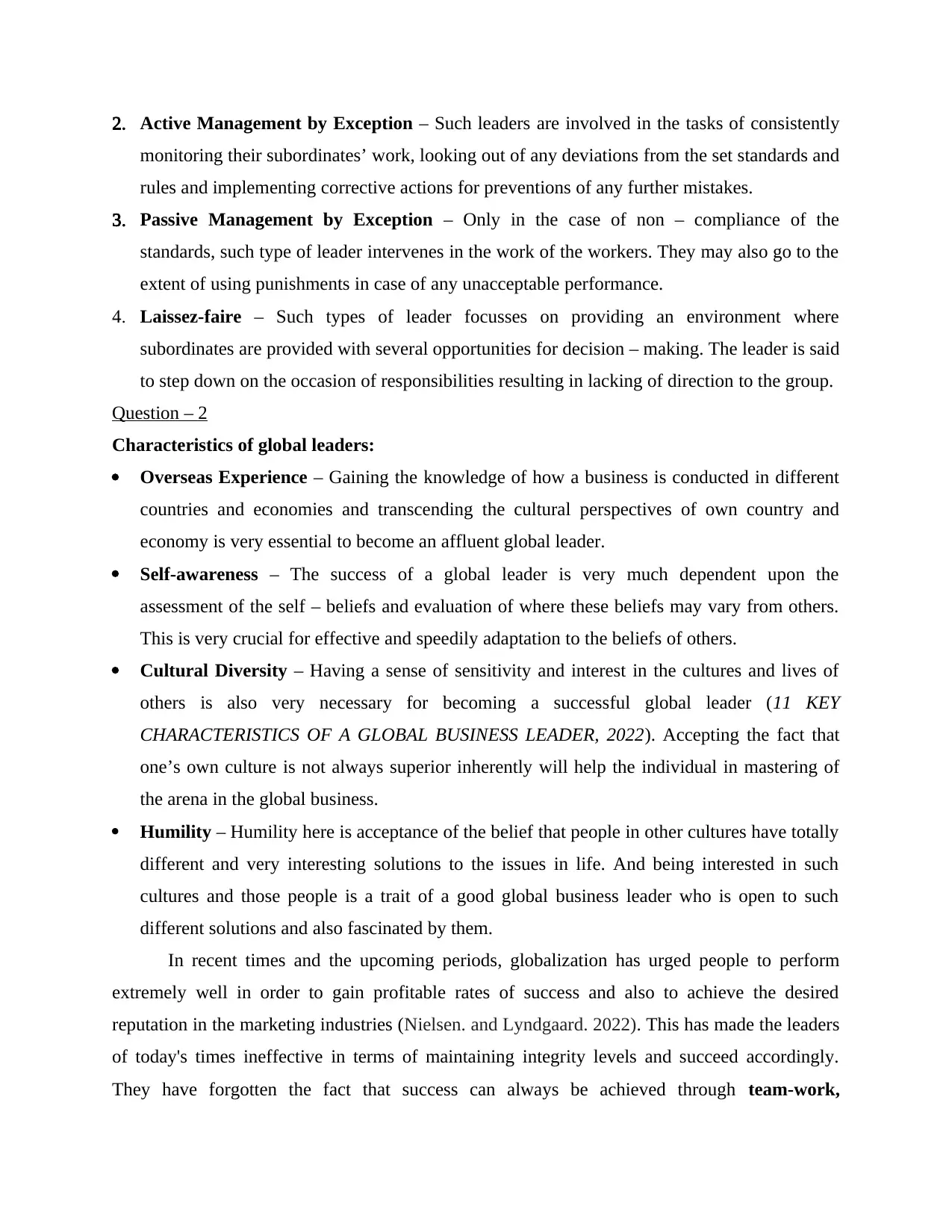
2. Active Management by Exception – Such leaders are involved in the tasks of consistently
monitoring their subordinates’ work, looking out of any deviations from the set standards and
rules and implementing corrective actions for preventions of any further mistakes.
3. Passive Management by Exception – Only in the case of non – compliance of the
standards, such type of leader intervenes in the work of the workers. They may also go to the
extent of using punishments in case of any unacceptable performance.
4. Laissez-faire – Such types of leader focusses on providing an environment where
subordinates are provided with several opportunities for decision – making. The leader is said
to step down on the occasion of responsibilities resulting in lacking of direction to the group.
Question – 2
Characteristics of global leaders:
Overseas Experience – Gaining the knowledge of how a business is conducted in different
countries and economies and transcending the cultural perspectives of own country and
economy is very essential to become an affluent global leader.
Self-awareness – The success of a global leader is very much dependent upon the
assessment of the self – beliefs and evaluation of where these beliefs may vary from others.
This is very crucial for effective and speedily adaptation to the beliefs of others.
Cultural Diversity – Having a sense of sensitivity and interest in the cultures and lives of
others is also very necessary for becoming a successful global leader (11 KEY
CHARACTERISTICS OF A GLOBAL BUSINESS LEADER, 2022). Accepting the fact that
one’s own culture is not always superior inherently will help the individual in mastering of
the arena in the global business.
Humility – Humility here is acceptance of the belief that people in other cultures have totally
different and very interesting solutions to the issues in life. And being interested in such
cultures and those people is a trait of a good global business leader who is open to such
different solutions and also fascinated by them.
In recent times and the upcoming periods, globalization has urged people to perform
extremely well in order to gain profitable rates of success and also to achieve the desired
reputation in the marketing industries (Nielsen. and Lyndgaard. 2022). This has made the leaders
of today's times ineffective in terms of maintaining integrity levels and succeed accordingly.
They have forgotten the fact that success can always be achieved through team-work,
monitoring their subordinates’ work, looking out of any deviations from the set standards and
rules and implementing corrective actions for preventions of any further mistakes.
3. Passive Management by Exception – Only in the case of non – compliance of the
standards, such type of leader intervenes in the work of the workers. They may also go to the
extent of using punishments in case of any unacceptable performance.
4. Laissez-faire – Such types of leader focusses on providing an environment where
subordinates are provided with several opportunities for decision – making. The leader is said
to step down on the occasion of responsibilities resulting in lacking of direction to the group.
Question – 2
Characteristics of global leaders:
Overseas Experience – Gaining the knowledge of how a business is conducted in different
countries and economies and transcending the cultural perspectives of own country and
economy is very essential to become an affluent global leader.
Self-awareness – The success of a global leader is very much dependent upon the
assessment of the self – beliefs and evaluation of where these beliefs may vary from others.
This is very crucial for effective and speedily adaptation to the beliefs of others.
Cultural Diversity – Having a sense of sensitivity and interest in the cultures and lives of
others is also very necessary for becoming a successful global leader (11 KEY
CHARACTERISTICS OF A GLOBAL BUSINESS LEADER, 2022). Accepting the fact that
one’s own culture is not always superior inherently will help the individual in mastering of
the arena in the global business.
Humility – Humility here is acceptance of the belief that people in other cultures have totally
different and very interesting solutions to the issues in life. And being interested in such
cultures and those people is a trait of a good global business leader who is open to such
different solutions and also fascinated by them.
In recent times and the upcoming periods, globalization has urged people to perform
extremely well in order to gain profitable rates of success and also to achieve the desired
reputation in the marketing industries (Nielsen. and Lyndgaard. 2022). This has made the leaders
of today's times ineffective in terms of maintaining integrity levels and succeed accordingly.
They have forgotten the fact that success can always be achieved through team-work,
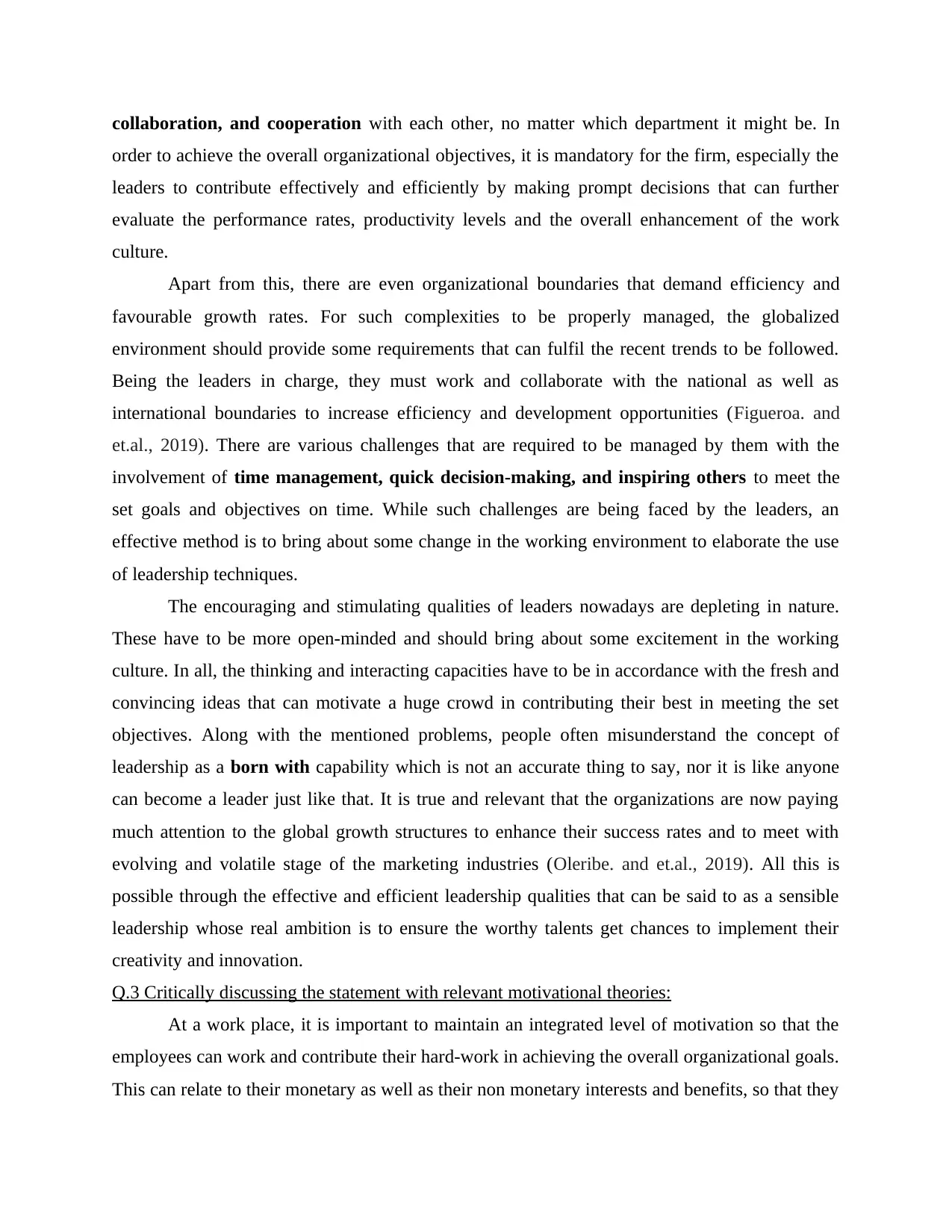
collaboration, and cooperation with each other, no matter which department it might be. In
order to achieve the overall organizational objectives, it is mandatory for the firm, especially the
leaders to contribute effectively and efficiently by making prompt decisions that can further
evaluate the performance rates, productivity levels and the overall enhancement of the work
culture.
Apart from this, there are even organizational boundaries that demand efficiency and
favourable growth rates. For such complexities to be properly managed, the globalized
environment should provide some requirements that can fulfil the recent trends to be followed.
Being the leaders in charge, they must work and collaborate with the national as well as
international boundaries to increase efficiency and development opportunities (Figueroa. and
et.al., 2019). There are various challenges that are required to be managed by them with the
involvement of time management, quick decision-making, and inspiring others to meet the
set goals and objectives on time. While such challenges are being faced by the leaders, an
effective method is to bring about some change in the working environment to elaborate the use
of leadership techniques.
The encouraging and stimulating qualities of leaders nowadays are depleting in nature.
These have to be more open-minded and should bring about some excitement in the working
culture. In all, the thinking and interacting capacities have to be in accordance with the fresh and
convincing ideas that can motivate a huge crowd in contributing their best in meeting the set
objectives. Along with the mentioned problems, people often misunderstand the concept of
leadership as a born with capability which is not an accurate thing to say, nor it is like anyone
can become a leader just like that. It is true and relevant that the organizations are now paying
much attention to the global growth structures to enhance their success rates and to meet with
evolving and volatile stage of the marketing industries (Oleribe. and et.al., 2019). All this is
possible through the effective and efficient leadership qualities that can be said to as a sensible
leadership whose real ambition is to ensure the worthy talents get chances to implement their
creativity and innovation.
Q.3 Critically discussing the statement with relevant motivational theories:
At a work place, it is important to maintain an integrated level of motivation so that the
employees can work and contribute their hard-work in achieving the overall organizational goals.
This can relate to their monetary as well as their non monetary interests and benefits, so that they
order to achieve the overall organizational objectives, it is mandatory for the firm, especially the
leaders to contribute effectively and efficiently by making prompt decisions that can further
evaluate the performance rates, productivity levels and the overall enhancement of the work
culture.
Apart from this, there are even organizational boundaries that demand efficiency and
favourable growth rates. For such complexities to be properly managed, the globalized
environment should provide some requirements that can fulfil the recent trends to be followed.
Being the leaders in charge, they must work and collaborate with the national as well as
international boundaries to increase efficiency and development opportunities (Figueroa. and
et.al., 2019). There are various challenges that are required to be managed by them with the
involvement of time management, quick decision-making, and inspiring others to meet the
set goals and objectives on time. While such challenges are being faced by the leaders, an
effective method is to bring about some change in the working environment to elaborate the use
of leadership techniques.
The encouraging and stimulating qualities of leaders nowadays are depleting in nature.
These have to be more open-minded and should bring about some excitement in the working
culture. In all, the thinking and interacting capacities have to be in accordance with the fresh and
convincing ideas that can motivate a huge crowd in contributing their best in meeting the set
objectives. Along with the mentioned problems, people often misunderstand the concept of
leadership as a born with capability which is not an accurate thing to say, nor it is like anyone
can become a leader just like that. It is true and relevant that the organizations are now paying
much attention to the global growth structures to enhance their success rates and to meet with
evolving and volatile stage of the marketing industries (Oleribe. and et.al., 2019). All this is
possible through the effective and efficient leadership qualities that can be said to as a sensible
leadership whose real ambition is to ensure the worthy talents get chances to implement their
creativity and innovation.
Q.3 Critically discussing the statement with relevant motivational theories:
At a work place, it is important to maintain an integrated level of motivation so that the
employees can work and contribute their hard-work in achieving the overall organizational goals.
This can relate to their monetary as well as their non monetary interests and benefits, so that they
⊘ This is a preview!⊘
Do you want full access?
Subscribe today to unlock all pages.

Trusted by 1+ million students worldwide
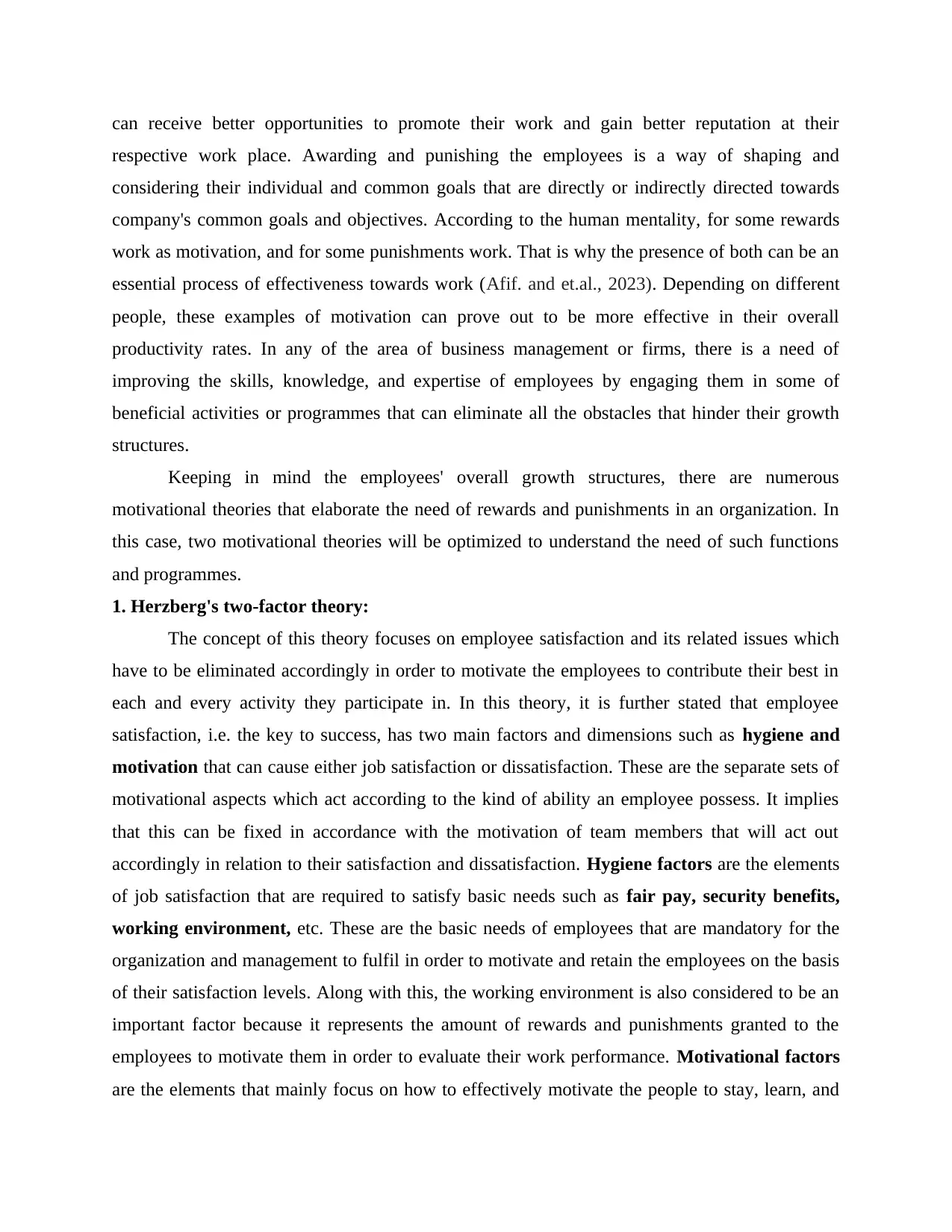
can receive better opportunities to promote their work and gain better reputation at their
respective work place. Awarding and punishing the employees is a way of shaping and
considering their individual and common goals that are directly or indirectly directed towards
company's common goals and objectives. According to the human mentality, for some rewards
work as motivation, and for some punishments work. That is why the presence of both can be an
essential process of effectiveness towards work (Afif. and et.al., 2023). Depending on different
people, these examples of motivation can prove out to be more effective in their overall
productivity rates. In any of the area of business management or firms, there is a need of
improving the skills, knowledge, and expertise of employees by engaging them in some of
beneficial activities or programmes that can eliminate all the obstacles that hinder their growth
structures.
Keeping in mind the employees' overall growth structures, there are numerous
motivational theories that elaborate the need of rewards and punishments in an organization. In
this case, two motivational theories will be optimized to understand the need of such functions
and programmes.
1. Herzberg's two-factor theory:
The concept of this theory focuses on employee satisfaction and its related issues which
have to be eliminated accordingly in order to motivate the employees to contribute their best in
each and every activity they participate in. In this theory, it is further stated that employee
satisfaction, i.e. the key to success, has two main factors and dimensions such as hygiene and
motivation that can cause either job satisfaction or dissatisfaction. These are the separate sets of
motivational aspects which act according to the kind of ability an employee possess. It implies
that this can be fixed in accordance with the motivation of team members that will act out
accordingly in relation to their satisfaction and dissatisfaction. Hygiene factors are the elements
of job satisfaction that are required to satisfy basic needs such as fair pay, security benefits,
working environment, etc. These are the basic needs of employees that are mandatory for the
organization and management to fulfil in order to motivate and retain the employees on the basis
of their satisfaction levels. Along with this, the working environment is also considered to be an
important factor because it represents the amount of rewards and punishments granted to the
employees to motivate them in order to evaluate their work performance. Motivational factors
are the elements that mainly focus on how to effectively motivate the people to stay, learn, and
respective work place. Awarding and punishing the employees is a way of shaping and
considering their individual and common goals that are directly or indirectly directed towards
company's common goals and objectives. According to the human mentality, for some rewards
work as motivation, and for some punishments work. That is why the presence of both can be an
essential process of effectiveness towards work (Afif. and et.al., 2023). Depending on different
people, these examples of motivation can prove out to be more effective in their overall
productivity rates. In any of the area of business management or firms, there is a need of
improving the skills, knowledge, and expertise of employees by engaging them in some of
beneficial activities or programmes that can eliminate all the obstacles that hinder their growth
structures.
Keeping in mind the employees' overall growth structures, there are numerous
motivational theories that elaborate the need of rewards and punishments in an organization. In
this case, two motivational theories will be optimized to understand the need of such functions
and programmes.
1. Herzberg's two-factor theory:
The concept of this theory focuses on employee satisfaction and its related issues which
have to be eliminated accordingly in order to motivate the employees to contribute their best in
each and every activity they participate in. In this theory, it is further stated that employee
satisfaction, i.e. the key to success, has two main factors and dimensions such as hygiene and
motivation that can cause either job satisfaction or dissatisfaction. These are the separate sets of
motivational aspects which act according to the kind of ability an employee possess. It implies
that this can be fixed in accordance with the motivation of team members that will act out
accordingly in relation to their satisfaction and dissatisfaction. Hygiene factors are the elements
of job satisfaction that are required to satisfy basic needs such as fair pay, security benefits,
working environment, etc. These are the basic needs of employees that are mandatory for the
organization and management to fulfil in order to motivate and retain the employees on the basis
of their satisfaction levels. Along with this, the working environment is also considered to be an
important factor because it represents the amount of rewards and punishments granted to the
employees to motivate them in order to evaluate their work performance. Motivational factors
are the elements that mainly focus on how to effectively motivate the people to stay, learn, and
Paraphrase This Document
Need a fresh take? Get an instant paraphrase of this document with our AI Paraphraser
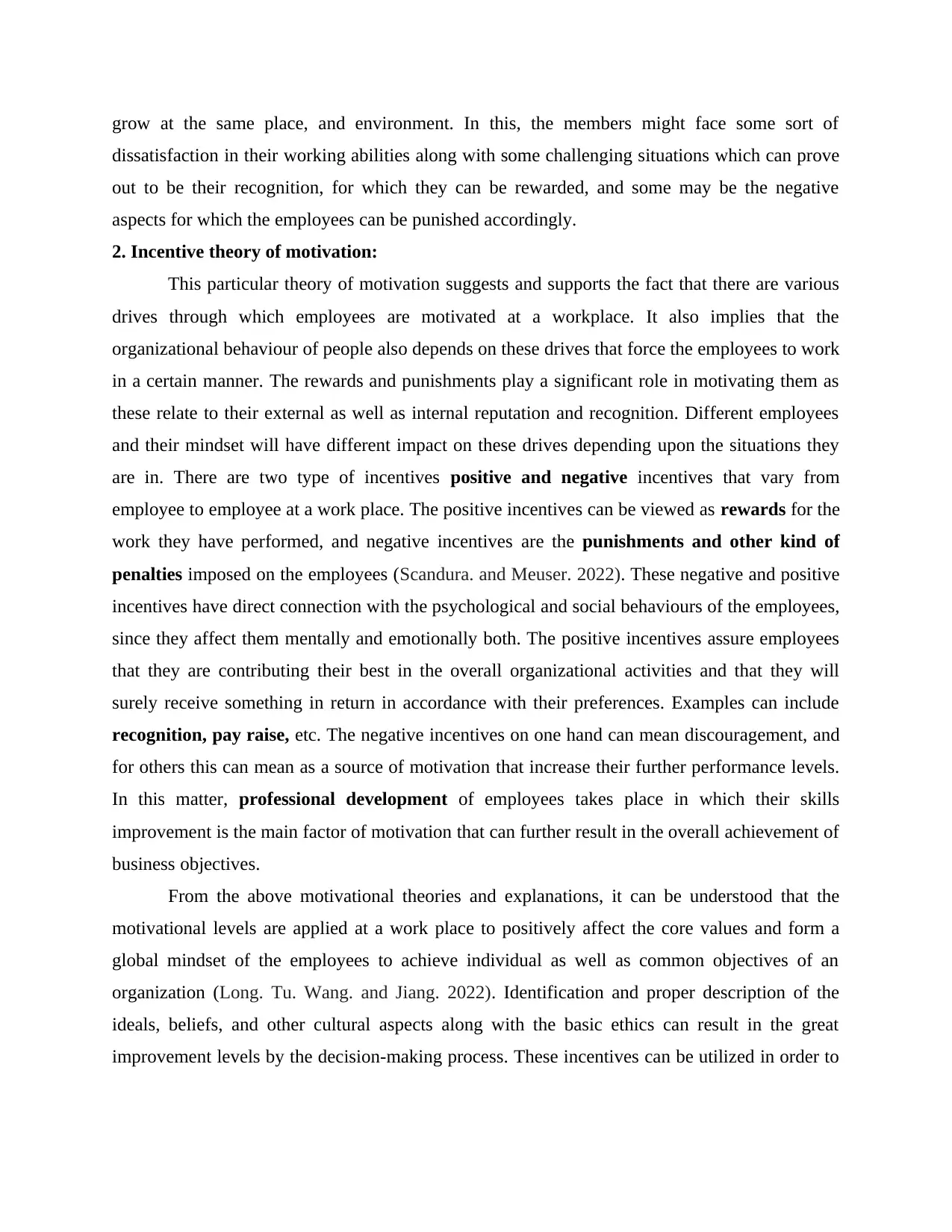
grow at the same place, and environment. In this, the members might face some sort of
dissatisfaction in their working abilities along with some challenging situations which can prove
out to be their recognition, for which they can be rewarded, and some may be the negative
aspects for which the employees can be punished accordingly.
2. Incentive theory of motivation:
This particular theory of motivation suggests and supports the fact that there are various
drives through which employees are motivated at a workplace. It also implies that the
organizational behaviour of people also depends on these drives that force the employees to work
in a certain manner. The rewards and punishments play a significant role in motivating them as
these relate to their external as well as internal reputation and recognition. Different employees
and their mindset will have different impact on these drives depending upon the situations they
are in. There are two type of incentives positive and negative incentives that vary from
employee to employee at a work place. The positive incentives can be viewed as rewards for the
work they have performed, and negative incentives are the punishments and other kind of
penalties imposed on the employees (Scandura. and Meuser. 2022). These negative and positive
incentives have direct connection with the psychological and social behaviours of the employees,
since they affect them mentally and emotionally both. The positive incentives assure employees
that they are contributing their best in the overall organizational activities and that they will
surely receive something in return in accordance with their preferences. Examples can include
recognition, pay raise, etc. The negative incentives on one hand can mean discouragement, and
for others this can mean as a source of motivation that increase their further performance levels.
In this matter, professional development of employees takes place in which their skills
improvement is the main factor of motivation that can further result in the overall achievement of
business objectives.
From the above motivational theories and explanations, it can be understood that the
motivational levels are applied at a work place to positively affect the core values and form a
global mindset of the employees to achieve individual as well as common objectives of an
organization (Long. Tu. Wang. and Jiang. 2022). Identification and proper description of the
ideals, beliefs, and other cultural aspects along with the basic ethics can result in the great
improvement levels by the decision-making process. These incentives can be utilized in order to
dissatisfaction in their working abilities along with some challenging situations which can prove
out to be their recognition, for which they can be rewarded, and some may be the negative
aspects for which the employees can be punished accordingly.
2. Incentive theory of motivation:
This particular theory of motivation suggests and supports the fact that there are various
drives through which employees are motivated at a workplace. It also implies that the
organizational behaviour of people also depends on these drives that force the employees to work
in a certain manner. The rewards and punishments play a significant role in motivating them as
these relate to their external as well as internal reputation and recognition. Different employees
and their mindset will have different impact on these drives depending upon the situations they
are in. There are two type of incentives positive and negative incentives that vary from
employee to employee at a work place. The positive incentives can be viewed as rewards for the
work they have performed, and negative incentives are the punishments and other kind of
penalties imposed on the employees (Scandura. and Meuser. 2022). These negative and positive
incentives have direct connection with the psychological and social behaviours of the employees,
since they affect them mentally and emotionally both. The positive incentives assure employees
that they are contributing their best in the overall organizational activities and that they will
surely receive something in return in accordance with their preferences. Examples can include
recognition, pay raise, etc. The negative incentives on one hand can mean discouragement, and
for others this can mean as a source of motivation that increase their further performance levels.
In this matter, professional development of employees takes place in which their skills
improvement is the main factor of motivation that can further result in the overall achievement of
business objectives.
From the above motivational theories and explanations, it can be understood that the
motivational levels are applied at a work place to positively affect the core values and form a
global mindset of the employees to achieve individual as well as common objectives of an
organization (Long. Tu. Wang. and Jiang. 2022). Identification and proper description of the
ideals, beliefs, and other cultural aspects along with the basic ethics can result in the great
improvement levels by the decision-making process. These incentives can be utilized in order to
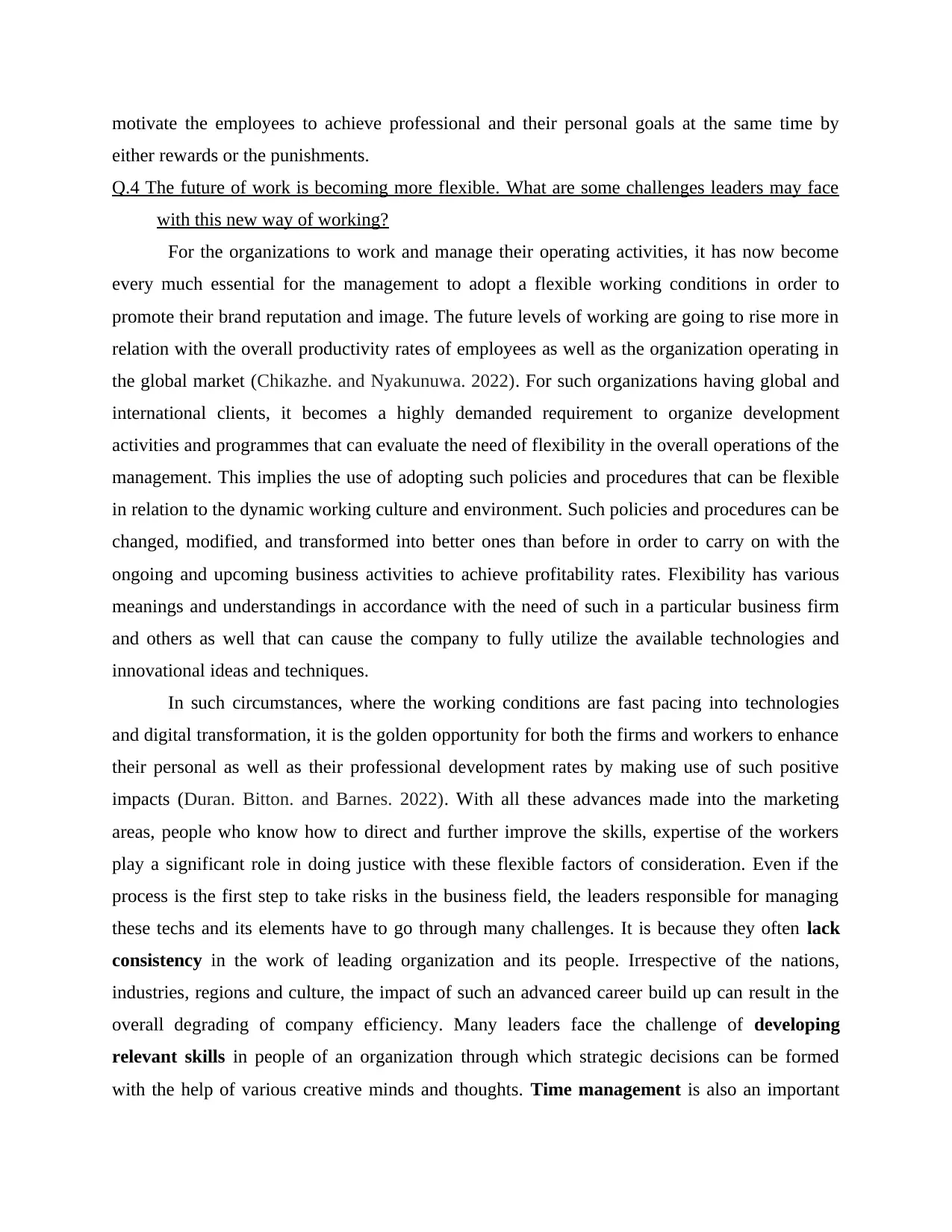
motivate the employees to achieve professional and their personal goals at the same time by
either rewards or the punishments.
Q.4 The future of work is becoming more flexible. What are some challenges leaders may face
with this new way of working?
For the organizations to work and manage their operating activities, it has now become
every much essential for the management to adopt a flexible working conditions in order to
promote their brand reputation and image. The future levels of working are going to rise more in
relation with the overall productivity rates of employees as well as the organization operating in
the global market (Chikazhe. and Nyakunuwa. 2022). For such organizations having global and
international clients, it becomes a highly demanded requirement to organize development
activities and programmes that can evaluate the need of flexibility in the overall operations of the
management. This implies the use of adopting such policies and procedures that can be flexible
in relation to the dynamic working culture and environment. Such policies and procedures can be
changed, modified, and transformed into better ones than before in order to carry on with the
ongoing and upcoming business activities to achieve profitability rates. Flexibility has various
meanings and understandings in accordance with the need of such in a particular business firm
and others as well that can cause the company to fully utilize the available technologies and
innovational ideas and techniques.
In such circumstances, where the working conditions are fast pacing into technologies
and digital transformation, it is the golden opportunity for both the firms and workers to enhance
their personal as well as their professional development rates by making use of such positive
impacts (Duran. Bitton. and Barnes. 2022). With all these advances made into the marketing
areas, people who know how to direct and further improve the skills, expertise of the workers
play a significant role in doing justice with these flexible factors of consideration. Even if the
process is the first step to take risks in the business field, the leaders responsible for managing
these techs and its elements have to go through many challenges. It is because they often lack
consistency in the work of leading organization and its people. Irrespective of the nations,
industries, regions and culture, the impact of such an advanced career build up can result in the
overall degrading of company efficiency. Many leaders face the challenge of developing
relevant skills in people of an organization through which strategic decisions can be formed
with the help of various creative minds and thoughts. Time management is also an important
either rewards or the punishments.
Q.4 The future of work is becoming more flexible. What are some challenges leaders may face
with this new way of working?
For the organizations to work and manage their operating activities, it has now become
every much essential for the management to adopt a flexible working conditions in order to
promote their brand reputation and image. The future levels of working are going to rise more in
relation with the overall productivity rates of employees as well as the organization operating in
the global market (Chikazhe. and Nyakunuwa. 2022). For such organizations having global and
international clients, it becomes a highly demanded requirement to organize development
activities and programmes that can evaluate the need of flexibility in the overall operations of the
management. This implies the use of adopting such policies and procedures that can be flexible
in relation to the dynamic working culture and environment. Such policies and procedures can be
changed, modified, and transformed into better ones than before in order to carry on with the
ongoing and upcoming business activities to achieve profitability rates. Flexibility has various
meanings and understandings in accordance with the need of such in a particular business firm
and others as well that can cause the company to fully utilize the available technologies and
innovational ideas and techniques.
In such circumstances, where the working conditions are fast pacing into technologies
and digital transformation, it is the golden opportunity for both the firms and workers to enhance
their personal as well as their professional development rates by making use of such positive
impacts (Duran. Bitton. and Barnes. 2022). With all these advances made into the marketing
areas, people who know how to direct and further improve the skills, expertise of the workers
play a significant role in doing justice with these flexible factors of consideration. Even if the
process is the first step to take risks in the business field, the leaders responsible for managing
these techs and its elements have to go through many challenges. It is because they often lack
consistency in the work of leading organization and its people. Irrespective of the nations,
industries, regions and culture, the impact of such an advanced career build up can result in the
overall degrading of company efficiency. Many leaders face the challenge of developing
relevant skills in people of an organization through which strategic decisions can be formed
with the help of various creative minds and thoughts. Time management is also an important
⊘ This is a preview!⊘
Do you want full access?
Subscribe today to unlock all pages.

Trusted by 1+ million students worldwide
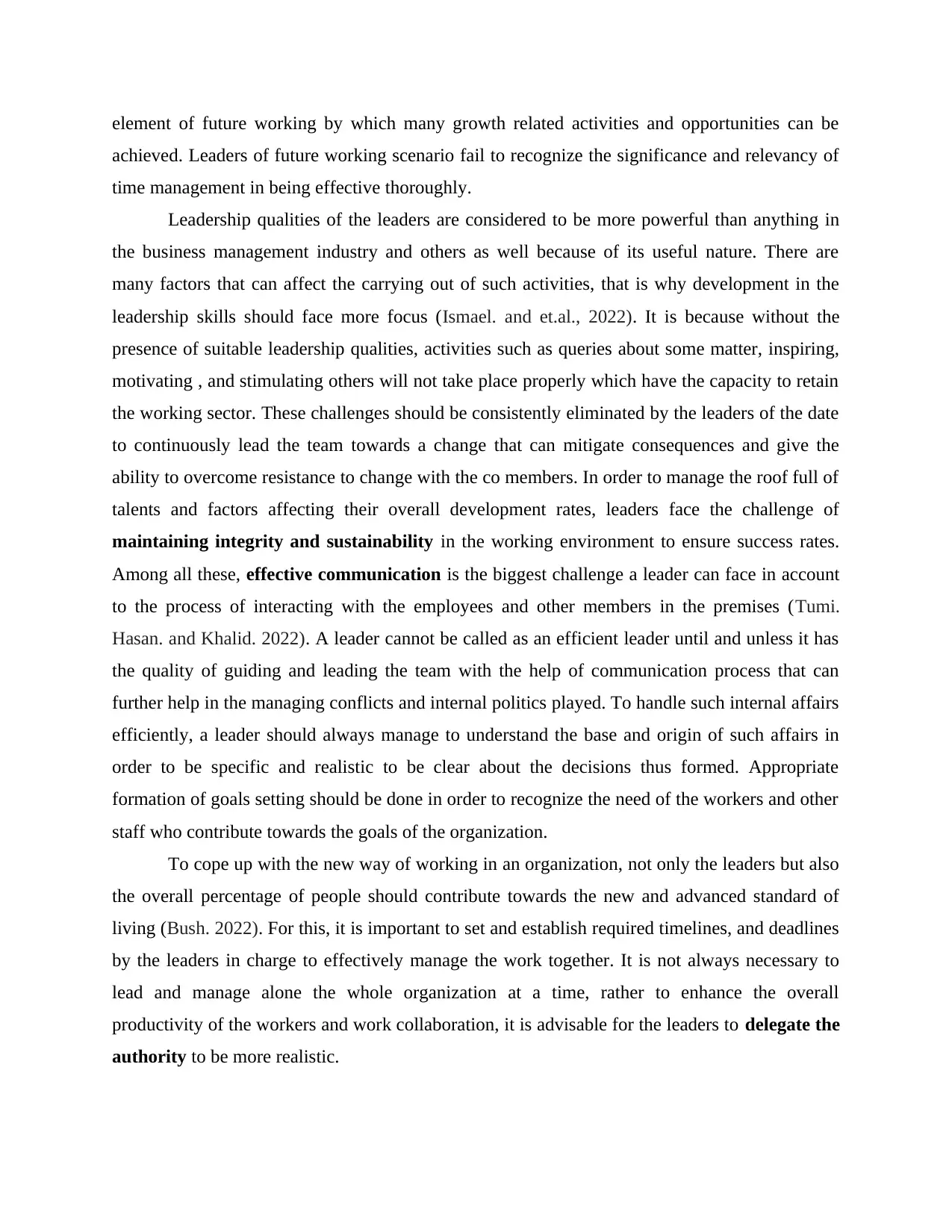
element of future working by which many growth related activities and opportunities can be
achieved. Leaders of future working scenario fail to recognize the significance and relevancy of
time management in being effective thoroughly.
Leadership qualities of the leaders are considered to be more powerful than anything in
the business management industry and others as well because of its useful nature. There are
many factors that can affect the carrying out of such activities, that is why development in the
leadership skills should face more focus (Ismael. and et.al., 2022). It is because without the
presence of suitable leadership qualities, activities such as queries about some matter, inspiring,
motivating , and stimulating others will not take place properly which have the capacity to retain
the working sector. These challenges should be consistently eliminated by the leaders of the date
to continuously lead the team towards a change that can mitigate consequences and give the
ability to overcome resistance to change with the co members. In order to manage the roof full of
talents and factors affecting their overall development rates, leaders face the challenge of
maintaining integrity and sustainability in the working environment to ensure success rates.
Among all these, effective communication is the biggest challenge a leader can face in account
to the process of interacting with the employees and other members in the premises (Tumi.
Hasan. and Khalid. 2022). A leader cannot be called as an efficient leader until and unless it has
the quality of guiding and leading the team with the help of communication process that can
further help in the managing conflicts and internal politics played. To handle such internal affairs
efficiently, a leader should always manage to understand the base and origin of such affairs in
order to be specific and realistic to be clear about the decisions thus formed. Appropriate
formation of goals setting should be done in order to recognize the need of the workers and other
staff who contribute towards the goals of the organization.
To cope up with the new way of working in an organization, not only the leaders but also
the overall percentage of people should contribute towards the new and advanced standard of
living (Bush. 2022). For this, it is important to set and establish required timelines, and deadlines
by the leaders in charge to effectively manage the work together. It is not always necessary to
lead and manage alone the whole organization at a time, rather to enhance the overall
productivity of the workers and work collaboration, it is advisable for the leaders to delegate the
authority to be more realistic.
achieved. Leaders of future working scenario fail to recognize the significance and relevancy of
time management in being effective thoroughly.
Leadership qualities of the leaders are considered to be more powerful than anything in
the business management industry and others as well because of its useful nature. There are
many factors that can affect the carrying out of such activities, that is why development in the
leadership skills should face more focus (Ismael. and et.al., 2022). It is because without the
presence of suitable leadership qualities, activities such as queries about some matter, inspiring,
motivating , and stimulating others will not take place properly which have the capacity to retain
the working sector. These challenges should be consistently eliminated by the leaders of the date
to continuously lead the team towards a change that can mitigate consequences and give the
ability to overcome resistance to change with the co members. In order to manage the roof full of
talents and factors affecting their overall development rates, leaders face the challenge of
maintaining integrity and sustainability in the working environment to ensure success rates.
Among all these, effective communication is the biggest challenge a leader can face in account
to the process of interacting with the employees and other members in the premises (Tumi.
Hasan. and Khalid. 2022). A leader cannot be called as an efficient leader until and unless it has
the quality of guiding and leading the team with the help of communication process that can
further help in the managing conflicts and internal politics played. To handle such internal affairs
efficiently, a leader should always manage to understand the base and origin of such affairs in
order to be specific and realistic to be clear about the decisions thus formed. Appropriate
formation of goals setting should be done in order to recognize the need of the workers and other
staff who contribute towards the goals of the organization.
To cope up with the new way of working in an organization, not only the leaders but also
the overall percentage of people should contribute towards the new and advanced standard of
living (Bush. 2022). For this, it is important to set and establish required timelines, and deadlines
by the leaders in charge to effectively manage the work together. It is not always necessary to
lead and manage alone the whole organization at a time, rather to enhance the overall
productivity of the workers and work collaboration, it is advisable for the leaders to delegate the
authority to be more realistic.
Paraphrase This Document
Need a fresh take? Get an instant paraphrase of this document with our AI Paraphraser
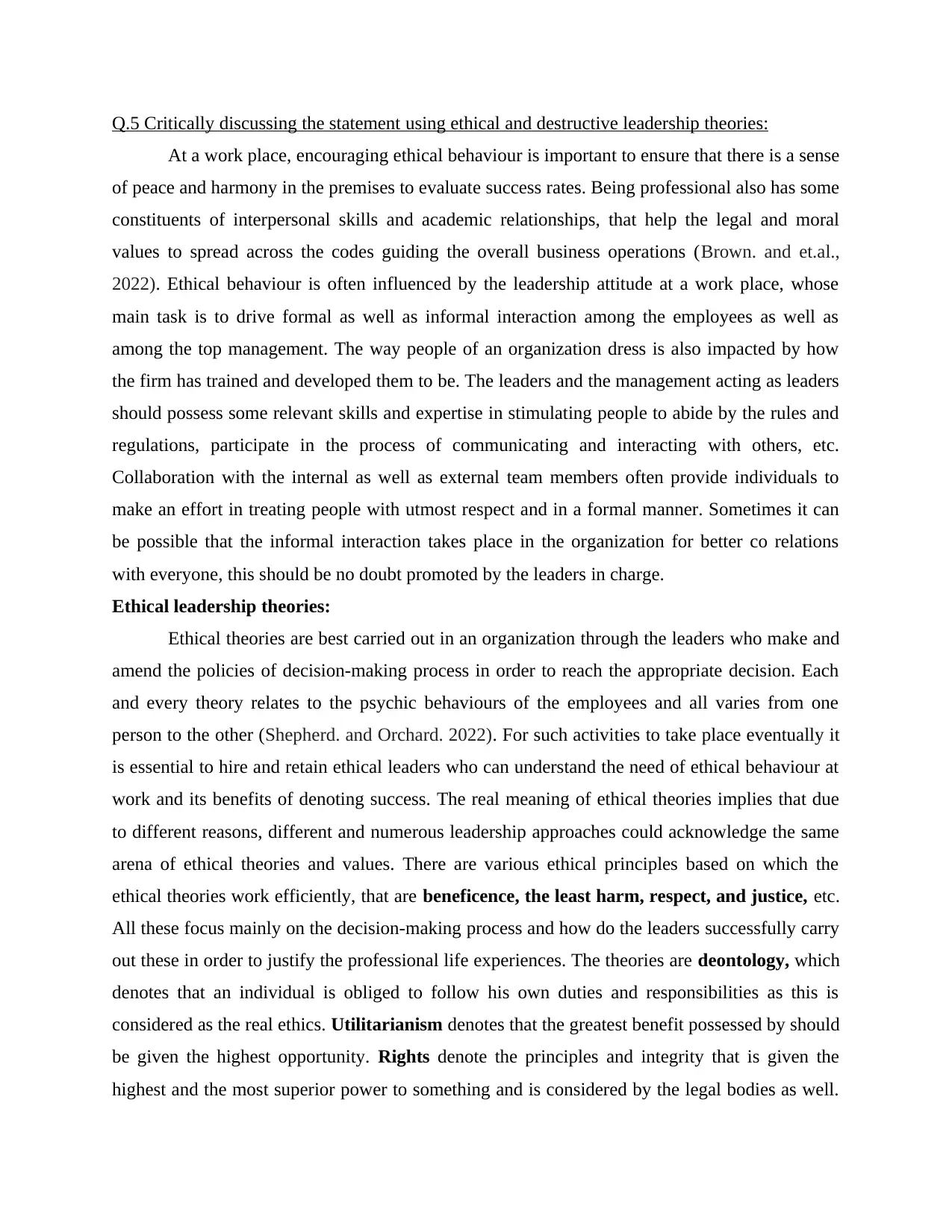
Q.5 Critically discussing the statement using ethical and destructive leadership theories:
At a work place, encouraging ethical behaviour is important to ensure that there is a sense
of peace and harmony in the premises to evaluate success rates. Being professional also has some
constituents of interpersonal skills and academic relationships, that help the legal and moral
values to spread across the codes guiding the overall business operations (Brown. and et.al.,
2022). Ethical behaviour is often influenced by the leadership attitude at a work place, whose
main task is to drive formal as well as informal interaction among the employees as well as
among the top management. The way people of an organization dress is also impacted by how
the firm has trained and developed them to be. The leaders and the management acting as leaders
should possess some relevant skills and expertise in stimulating people to abide by the rules and
regulations, participate in the process of communicating and interacting with others, etc.
Collaboration with the internal as well as external team members often provide individuals to
make an effort in treating people with utmost respect and in a formal manner. Sometimes it can
be possible that the informal interaction takes place in the organization for better co relations
with everyone, this should be no doubt promoted by the leaders in charge.
Ethical leadership theories:
Ethical theories are best carried out in an organization through the leaders who make and
amend the policies of decision-making process in order to reach the appropriate decision. Each
and every theory relates to the psychic behaviours of the employees and all varies from one
person to the other (Shepherd. and Orchard. 2022). For such activities to take place eventually it
is essential to hire and retain ethical leaders who can understand the need of ethical behaviour at
work and its benefits of denoting success. The real meaning of ethical theories implies that due
to different reasons, different and numerous leadership approaches could acknowledge the same
arena of ethical theories and values. There are various ethical principles based on which the
ethical theories work efficiently, that are beneficence, the least harm, respect, and justice, etc.
All these focus mainly on the decision-making process and how do the leaders successfully carry
out these in order to justify the professional life experiences. The theories are deontology, which
denotes that an individual is obliged to follow his own duties and responsibilities as this is
considered as the real ethics. Utilitarianism denotes that the greatest benefit possessed by should
be given the highest opportunity. Rights denote the principles and integrity that is given the
highest and the most superior power to something and is considered by the legal bodies as well.
At a work place, encouraging ethical behaviour is important to ensure that there is a sense
of peace and harmony in the premises to evaluate success rates. Being professional also has some
constituents of interpersonal skills and academic relationships, that help the legal and moral
values to spread across the codes guiding the overall business operations (Brown. and et.al.,
2022). Ethical behaviour is often influenced by the leadership attitude at a work place, whose
main task is to drive formal as well as informal interaction among the employees as well as
among the top management. The way people of an organization dress is also impacted by how
the firm has trained and developed them to be. The leaders and the management acting as leaders
should possess some relevant skills and expertise in stimulating people to abide by the rules and
regulations, participate in the process of communicating and interacting with others, etc.
Collaboration with the internal as well as external team members often provide individuals to
make an effort in treating people with utmost respect and in a formal manner. Sometimes it can
be possible that the informal interaction takes place in the organization for better co relations
with everyone, this should be no doubt promoted by the leaders in charge.
Ethical leadership theories:
Ethical theories are best carried out in an organization through the leaders who make and
amend the policies of decision-making process in order to reach the appropriate decision. Each
and every theory relates to the psychic behaviours of the employees and all varies from one
person to the other (Shepherd. and Orchard. 2022). For such activities to take place eventually it
is essential to hire and retain ethical leaders who can understand the need of ethical behaviour at
work and its benefits of denoting success. The real meaning of ethical theories implies that due
to different reasons, different and numerous leadership approaches could acknowledge the same
arena of ethical theories and values. There are various ethical principles based on which the
ethical theories work efficiently, that are beneficence, the least harm, respect, and justice, etc.
All these focus mainly on the decision-making process and how do the leaders successfully carry
out these in order to justify the professional life experiences. The theories are deontology, which
denotes that an individual is obliged to follow his own duties and responsibilities as this is
considered as the real ethics. Utilitarianism denotes that the greatest benefit possessed by should
be given the highest opportunity. Rights denote the principles and integrity that is given the
highest and the most superior power to something and is considered by the legal bodies as well.
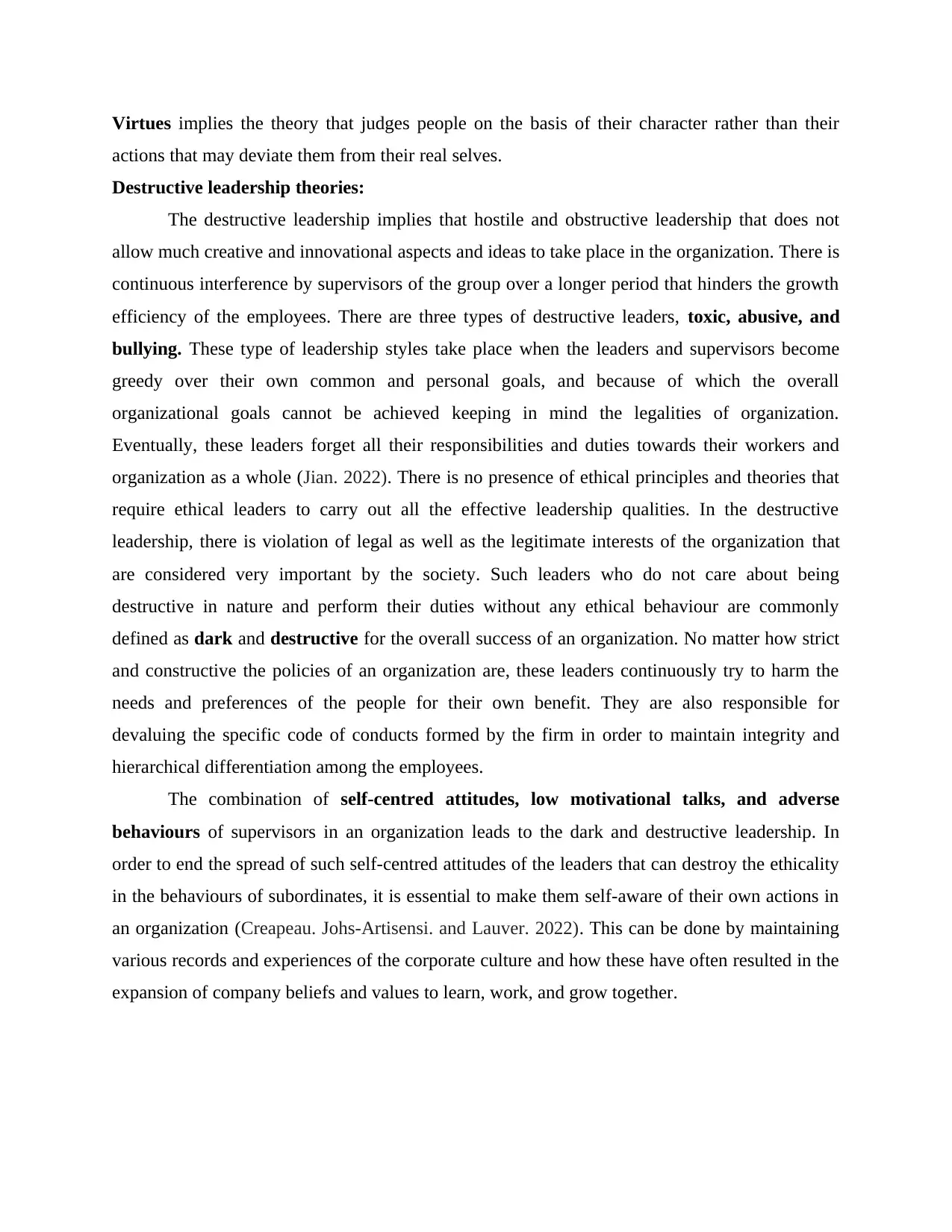
Virtues implies the theory that judges people on the basis of their character rather than their
actions that may deviate them from their real selves.
Destructive leadership theories:
The destructive leadership implies that hostile and obstructive leadership that does not
allow much creative and innovational aspects and ideas to take place in the organization. There is
continuous interference by supervisors of the group over a longer period that hinders the growth
efficiency of the employees. There are three types of destructive leaders, toxic, abusive, and
bullying. These type of leadership styles take place when the leaders and supervisors become
greedy over their own common and personal goals, and because of which the overall
organizational goals cannot be achieved keeping in mind the legalities of organization.
Eventually, these leaders forget all their responsibilities and duties towards their workers and
organization as a whole (Jian. 2022). There is no presence of ethical principles and theories that
require ethical leaders to carry out all the effective leadership qualities. In the destructive
leadership, there is violation of legal as well as the legitimate interests of the organization that
are considered very important by the society. Such leaders who do not care about being
destructive in nature and perform their duties without any ethical behaviour are commonly
defined as dark and destructive for the overall success of an organization. No matter how strict
and constructive the policies of an organization are, these leaders continuously try to harm the
needs and preferences of the people for their own benefit. They are also responsible for
devaluing the specific code of conducts formed by the firm in order to maintain integrity and
hierarchical differentiation among the employees.
The combination of self-centred attitudes, low motivational talks, and adverse
behaviours of supervisors in an organization leads to the dark and destructive leadership. In
order to end the spread of such self-centred attitudes of the leaders that can destroy the ethicality
in the behaviours of subordinates, it is essential to make them self-aware of their own actions in
an organization (Creapeau. Johs-Artisensi. and Lauver. 2022). This can be done by maintaining
various records and experiences of the corporate culture and how these have often resulted in the
expansion of company beliefs and values to learn, work, and grow together.
actions that may deviate them from their real selves.
Destructive leadership theories:
The destructive leadership implies that hostile and obstructive leadership that does not
allow much creative and innovational aspects and ideas to take place in the organization. There is
continuous interference by supervisors of the group over a longer period that hinders the growth
efficiency of the employees. There are three types of destructive leaders, toxic, abusive, and
bullying. These type of leadership styles take place when the leaders and supervisors become
greedy over their own common and personal goals, and because of which the overall
organizational goals cannot be achieved keeping in mind the legalities of organization.
Eventually, these leaders forget all their responsibilities and duties towards their workers and
organization as a whole (Jian. 2022). There is no presence of ethical principles and theories that
require ethical leaders to carry out all the effective leadership qualities. In the destructive
leadership, there is violation of legal as well as the legitimate interests of the organization that
are considered very important by the society. Such leaders who do not care about being
destructive in nature and perform their duties without any ethical behaviour are commonly
defined as dark and destructive for the overall success of an organization. No matter how strict
and constructive the policies of an organization are, these leaders continuously try to harm the
needs and preferences of the people for their own benefit. They are also responsible for
devaluing the specific code of conducts formed by the firm in order to maintain integrity and
hierarchical differentiation among the employees.
The combination of self-centred attitudes, low motivational talks, and adverse
behaviours of supervisors in an organization leads to the dark and destructive leadership. In
order to end the spread of such self-centred attitudes of the leaders that can destroy the ethicality
in the behaviours of subordinates, it is essential to make them self-aware of their own actions in
an organization (Creapeau. Johs-Artisensi. and Lauver. 2022). This can be done by maintaining
various records and experiences of the corporate culture and how these have often resulted in the
expansion of company beliefs and values to learn, work, and grow together.
⊘ This is a preview!⊘
Do you want full access?
Subscribe today to unlock all pages.

Trusted by 1+ million students worldwide
1 out of 14
Related Documents
Your All-in-One AI-Powered Toolkit for Academic Success.
+13062052269
info@desklib.com
Available 24*7 on WhatsApp / Email
![[object Object]](/_next/static/media/star-bottom.7253800d.svg)
Unlock your academic potential
Copyright © 2020–2026 A2Z Services. All Rights Reserved. Developed and managed by ZUCOL.




